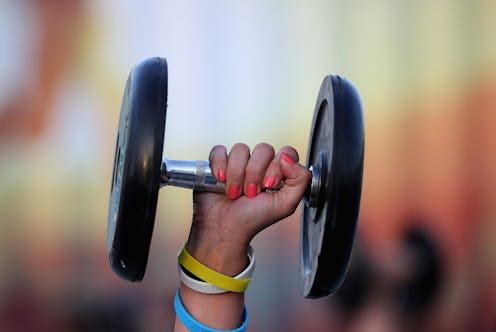Life
The Time You Work Out Can Have This Surprising Effect On Your Body’s Clock

Your body clock, otherwise known as the circadian rhythm, is one of those things that can work for you or against you when it comes to getting great sleep at night. If you have trouble winding down before bedtime, a circadian rhythm reset might be the answer. Now, researchers from Arizona State University (ASU), and University of California, San Diego, say that the time of day you exercise can actually shift your body's clock. This is especially good news for people working nights, or whose travel schedules cause jet lag.
“Exercise elicits certain circadian phase-shifting effects, but additional information is needed,” the study’s authors wrote in the paper. Lead study author Shawn Youngstedt, a professor at the Arizona State University (ASU) College of Nursing and Health Innovation, said that he and his colleagues wanted to further explore existing research that shows how exercise can influence the body clock, according to an ASU press release on the study. “We know that it can affect the internal clock, but there was never a clear understanding of what time of day exercise causes delays and when exercise advances the body clock. Without knowing this information, it is more difficult to help people who have body-clock disturbances,” he said.
Published in the Journal of Physiology, the study shows that exercising in the morning or afternoon can help balance out disruptions to the body’s internal clock. The circadian rhythm, in part, regulates sleep cycles, and by exercising at 7 a.m., or between 1 and 4 p.m., you can shift your circadian rhythm to an earlier orientation — making earlier bedtimes (and earlier rising) easier. The study showed that exercising between 7 p.m. and 10 p.m. shifted the body clock to later in the day and evening.
“Exercise has been known to cause changes to our body clock,” Youngstedt said in a statement reported by Neuroscience News. “We were able to clearly show in this study when exercise delays the body clock and when it advances it. This is the first study to compare exercise’s effects on the body clock, and could open up the possibility of using exercise to help counter the negative effects of jet lag and shift work.” While the positive effects of exercise on sleep patterns are well known, deliberately tweaking your body clock by exercising at certain times may mean the difference between poor sleep and quality rest, the study’s authors show.
Minimizing additional sleep disruptors is also important, Youngstedt said, according to the ASU press release. Getting enough exposure to outdoor light every day, sleeping in total darkness (blackout curtains or a sleep mask can help), and regular physical activity can all make getting out of bed a little easier in the morning. Even light from your cell phone can delay your body clock, Youngstedt said, so shutting it off before bed is key.
Youngstedt said in the press release that, while further research is needed to fully understand how exercise can shift your circadian rhythm, these findings show that exercising at certain times might be a simple and accessible way for people to adjust to shift work and strenuous travel schedules. If you know that flying across the country is going to lead to some serious jet lag soon, or you manage working nights, timing your exercise may help you adjust and sleep better at bedtime.